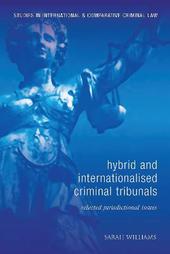
|
Hybrid and Internationalised Criminal Tribunals: Selected Jurisdictional Issues
Hardback
Main Details
| Title |
Hybrid and Internationalised Criminal Tribunals: Selected Jurisdictional Issues
|
| Authors and Contributors |
By (author) Sarah Williams
|
| Series | Studies in International and Comparative Criminal Law |
|---|
| Physical Properties |
| Format:Hardback | | Pages:520 | | Dimensions(mm): Height 234,Width 156 |
|
| ISBN/Barcode |
9781841136721
|
| Classifications | Dewey:345.0235 |
|---|
| Audience | | Professional & Vocational | |
|---|
|
Publishing Details |
| Publisher |
Bloomsbury Publishing PLC
|
| Imprint |
Hart Publishing
|
| Publication Date |
2 April 2012 |
| Publication Country |
United Kingdom
|
Description
In recent years a number of criminal tribunals have been established to investigate, prosecute and try individuals accused of serious violations of international humanitarian law and international human rights law. These tribunals have been described as 'hybrid' or 'internationalised' tribunals as their structure and applicable law consist of both international and national elements. Six such tribunals are currently in operation: the Special Court for Sierra Leone, the Extraordinary Chambers in the Courts of Cambodia, the International Judges and Prosecutors Programme in Kosovo, the War Crimes Chamber for Bosnia and Herzegovina, the Iraqi High Tribunal and the Special Tribunal for Lebanon. The Special Panels for Serious Crimes in East Timor suspended operation in May 2005, although there continues to be some international involvement in investigation and prosecution of serious crimes. Suggestions have also been made that this model of tribunal would be appropriate for the prosecution of atrocities committed in, among others, Burundi, the Sudan, the Democratic Republic of Congo, Kenya and Liberia, as well as for a wider range of international crimes, most recently piracy. The key aims of this book are: to place the model of hybrid and internationalised tribunals in the context of other mechanisms to try international crimes; to examine the increasing demand for the establishment of hybrid and internationalised judicial institutions and the factors driving such demand; to define the category of 'hybrid and internationalised tribunals' by examining the key features of the existing and proposed hybrid or internationalised tribunals, as well as the features of those institutions with international elements that are generally excluded from this category; to determine the legal and jurisdictional bases of existing hybrid and internationalised tribunals; to analyse how the legal and jurisdictional basis of a tribunal affects other issues, such as the applicable law, the application of amnesties and immunities and the relationship of the tribunal with the host state, third states, national courts and other international criminal tribunals. The book concentrates on the definitional, legal and jurisdictional aspects of hybrid and internationalised criminal tribunals as this has been the subject of some confusion in arguments before the tribunals and in the judgments of the tribunals. In its concluding section, the book examines the future role of internationalised and hybrid criminal tribunals, particularly in light of the establishment of the ICC, and the potential use of such tribunals in other contexts. It also assesses how hybrid and internationalised tribunals fit into a 'multi-layered framework' of international criminal law and transitional justice.
Author Biography
Sarah Williams is a Senior Lecturer at the University of New South Wales, Australia. She was previously the Dorset Fellow in Public International Law at the British Institute of International and Comparative Law, Legal Researcher at the Foreign and Commonwealth Office of the United Kingdom and a lecturer in law at Durham University.
ReviewsThese technical and often thorny legal issues have real practical significance to all who appear before international criminal tribunals. The author discusses them with her characteristically thorough analysis and rigourously methodical research. This book will be of interest to all those who appear before extant and future tribunals regardless of the process by which they came ot be established. It is also a significant contribution to the academic analysis of the struggle against impunity. -- James Mehigan * Australian International Law Journal, Volume 19 * J. Frank Dobie, the renowned Texan author, once wrote that the 'average PhD thesis is nothing but a transference of bones from one graveyard to another'. Dobie apparently viewed the majority of student theses as academic requirements, destined to collect dust in a campus repository...Thankfully, the theses drafted by Sarah Williams and Silvia D'Ascoli were not destined for such a fate, finding a saviour in Hart Publishing, which incorporated the texts into its Studies in International and Comparative Criminal Law Series. ...both books contribute greatly to areas of international criminal law in need of further treatment each should be proud to have contributed in a meaningful way to this emerging body of jurisprudence. Joint review of 'Hybrid and Internationalised Criminal Tribunals' by Sarah Williams and 'Sentencing in International Criminal Law' by Silvia D'Ascoli -- Matthew Kane * International Affairs 88:5 * Sarah Williams' admirable book [is] a welcome and long overdue contribution to this field of scholarship. The breadth and heterogeneity of the subject-matter make her book a truly remarkable achievement and a must-read for anyone who wants to sudy hybrid and internationalised tribunals. -- Patryk I. Labuda * Zeitschrift fur Auslandisches oeffentliches Recht und Voelkerrecht, Volume 74(2) *
|